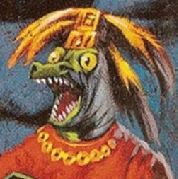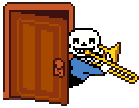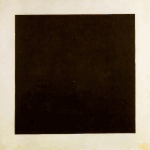|
If you're saying that all debuffs will have the keyword "Debuff" and no other indication that they are Standard actions that can be used once per Encounter then that might cause issues with readability, since now you have to remember that Debuffs are always X and Y, and if the only guy who really uses them at the table remembers wrong it will be a while before anyone notices. Having it as a standardised power creation guideline would be grand though.
|
|
|
|

|
| # ? Jun 3, 2024 15:22 |
|
Well, the goal was the former, with the added benefit of the latter; you get the "one line in the statblock instead of two" as well as "one rule fits all." I was planning to set it up as an index/table, in the vein of pg.277 of the 4e PHB; alternatively, do it as a DM/player aid where the "pairings" are all spelled out on a quick-reference card. I was thinking/hoping people would pick up on the system with some play experience, but would it be more "elegant" to keep the same power-building concept but just spell it out for the players in every statblock? One factor to consider is that the way I have classes built, most use only 1-2 different attack types. So a "white mage" mostly has buffs and debuffs, a "black mage" mostly has debuffs and summons, a "grey mage" mostly has direct-damage spells, etc. Would this help avoid, or would it further exacerbate the "only one guy at the table knows how this attack type works" scenario you describe?
|
|
|
|
Zandar posted:It pretty much is, actually, unless you have roll-under-half mechanics or something. "Roll under x on d20" is the same as "roll d20 and add x to beat DC21". The only difference is that skills are usually assumed to be bounded in a roll-under system. I know this is from the last page already but let me expand a bit on it, what I mean when I say that percentile is really hard to balance due to swinginess is from the perspective of a guy who has to come up with skills/talents/whatever and has to take every single 1% into consideration. In d20 the minimum bonus/penalty that powers/skills/whatever can give you is of +1, which is five times as much as the minimum that percentile works with. This means coming up with an internally tight subsystem for grading what the odds of 1% to 4% are worth when compared to everything else a character could be getting with their XP or character growth equivalent of choice. Then it gets weirder, because those odds are so pitiful you have to make abilities based on them come in bulk, so they actually can ever count for something. Unless you really know what you're doing and streamline the poo poo out of your options, this is going to lead to a glut of abilities. Then you need to work in the stuff that comes in the 10% and higher range into the rules, the abilities or options that make for tactical choices in gameplay, without making all the others obsolete. This stops being an issue if you don't give a crap about tight, balanced designs and just handwave 3%'s and 9%'s however you wish all over the place, but I trust I don't need to explain why that's not a very good idea. I'm simplifying the issue a lot and I hope my words make sense. I want to love percentile as a resolution system but it has so many underlying issues and it needs a very careful approach to make a game with it that doesn't waste its elegant framework.
|
|
|
|
zachol posted:GURPS runs into the problem where it's usually a good idea to just improve your stats, instead of buying up skills. I sort of like point buy systems, but I don't like the same points going towards both stats and skills, because then you have to balance whether it's more efficient to put them in one or the other. You end up needing to put caps on how many points you can spend in each category. It depends. It's not usually a good idea to just improve your stats by any means - it might be cheaper to, for instance, get Broadsword, Knitting, Stealth and Lockpicking to 14 by raising DX than to get Broadsword to 18 by skilling it directly, but for many characters one very high skill might be more useful than a wide spread of evenly good skills. There is definitely some math involved sometimes though, yeah. There are reasons to improve skills instead of improving stats, though, and vice versa.
|
|
|
|
This thread has been a lot of help and I've made plenty of progress with my game based on its advice, and now I'm getting down to the testing phase and have been finding a few issues that I want to correct that I'd really like some advice on. The game is intended to work as a fantasy heartbreaker/ dungeon-crawly kind of game with simple character creation (which still allows for decent character customization and meaningful options) & crunchy tactical combat. My goal was to aim for an idealized sweet-spot where players could take advantage of things like their positioning, area hazards & their characters powers/abilities to all contribute differently in combat but not leave anyone too underpowered. I want to avoid having over-long combat turns or having to track lots of fiddly little bonuses and penalties, while still giving players options more complex than "I hit him" if they want to use them. So far the combat system hews a bit too close to the D&D model of "roll initiative, act in order & repeat on next turn", and lots of attacks or abilities try to have players gain a bonus to their initiative or penalize the enemies initiative (under the idea that if you act earlier you have a higher chance of killing them before they can kill you). I'm hoping to find some newer and fresher ideas to revitalize things, while still remaining simple enough that you can get new players in a game within minutes instead of hours.
|
|
|
|
|
TK-31 posted:I know this is from the last page already but let me expand a bit on it, what I mean when I say that percentile is really hard to balance due to swinginess is from the perspective of a guy who has to come up with skills/talents/whatever and has to take every single 1% into consideration. In d20 the minimum bonus/penalty that powers/skills/whatever can give you is of +1, which is five times as much as the minimum that percentile works with. This means coming up with an internally tight subsystem for grading what the odds of 1% to 4% are worth when compared to everything else a character could be getting with their XP or character growth equivalent of choice. Oh sure, that makes sense. I've just generally understood swinginess to be related to the shape of the dice's probability distribution, whereas the problems with d100 are more to do with how fine its results are and how little a 2% difference means. I know that a fair few d100 systems work almost entirely in 5% increments to avoid just what you've said, which makes it odd that they used that system in the first place.
|
|
|
|
Zandar posted:Oh sure, that makes sense. I've just generally understood swinginess to be related to the shape of the dice's probability distribution, whereas the problems with d100 are more to do with how fine its results are and how little a 2% difference means. I know that a fair few d100 systems work almost entirely in 5% increments to avoid just what you've said, which makes it odd that they used that system in the first place. As I said, you can avoid much of this by dishing out your percentages in multiples of 5 but at that point you're basically using a d20. P.d0t posted:Would this help avoid, or would it further exacerbate the "only one guy at the table knows how this attack type works" scenario you describe? *Except where you have a particular one who's entire shtick is that it's got a different refresh/action type than the others. Splicer fucked around with this message at 10:56 on Oct 23, 2012 |
|
|
|
quote:I want to avoid having over-long combat turns or having to track lots of fiddly little bonuses and penalties, while still giving players options more complex than "I hit him" if they want to use them. I'm a big fan of D6 dice pools for this sort of thing (as long as you keep the pool reasonably sized). You can take bonuses out of the equation entirely, if you want, when using a pool. Roll [X] D6s. Any roll of [X] or better is a hit. Multiple successes can be used to pay for some special abilities or riders or whatever. It's intuitive and it's usually pretty quick (again, assuming you keep that die pool pretty small. Rolling 10+ dice and sorting-out the successes is when things become tedious with pools).
|
|
|
|
Splicer posted:Swingyness has been used to mean a couple of different things by a couple of different people on this page, TK-31 was using the same (and on reflection, incorrect) definition I was. I can't think of an accurate pithy term for this issue though. Granularity? You're talking about something being broken down into parts so small that no individual part tells you anything about the whole, right?
|
|
|
|
Granularity always seems like the degree of flexibility in a roll. A d20 chops things into 5% blocks, while a d100 gives you 1% blocks, and a d4 gives you 25% blocks. 2d6 gives you 9% blocks but weighted into a bell curve.
|
|
|
|
HitTheTargets posted:Granularity? You're talking about something being broken down into parts so small that no individual part tells you anything about the whole, right? Is fiddlyness the word I'm looking for?
|
|
|
|
I think precision is probably closer to the right word, with the caveat that lesser degrees of precision are not inherently bad.
|
|
|
|
Humbug Scoolbus posted:A d20 chops things into 5% blocks, while a d100 gives you 1% blocks, and a d4 gives you 25% blocks. 2d6 gives you 9% blocks but weighted into a bell curve. If all of those are, say, to-hit rolls, then it's a trick question: they're equally granular, because they each have the same number of possible results.
|
|
|
|
Now if you come up with a specific feature of the dice you want to exploit, such as getting doubles on 2d10 (on a normal d% roll) or 2d6 enabling specific mechanics (say a critical hit), that would be a meaningful difference because doubles would be far more common on 2d6 (1/6 versus 1/10). It would also be distinct from the chance of a natural 20 on a d20. Or maybe the dice explode in which case die size is important, or you like how a bell curve roll makes smaller, more easily handled bonuses more valuable in certain situations (a +2 on a d20 is a flat +10% always, but the same bonus on 2d6 can make a huge difference). All of these can impact design. Talking "meaningful" in the sense of "what do I learn from the roll", that's a bit trickier. You can look at a roll as a question you're asking and want an answer to. By far most RPGs make this a [No/Yes] question, such as "do I hit on this attack?", and the roll gives an answer. And... that's it. That's basically all they do with it. Some rolls might have "critical" success/failure, turning the question into a [Hell No/No/Yes/Hell Yes] one, but that's still ultimately the same question. Pretty much every system pre-d20 did things this way. Then you get games like Apocalypse/Dungeon World, where the answer spectrum involves different consequences. A roll can give you a [No/ Yes, But /Yes] answer, with the "But" bit being a potential consequence, concession, cost or similar effect of having succeeded. You could expand on that and have a "No, But" in there to indicate that you did not succeed but made some kind of progress towards your goal anyway. You could have criticals on each end, giving you a crazy [Hell No / No / No, But / Yes, But /Yes / Hell Yes] range of potential information outcomes. You can even go one further and ask, "do I want more than one piece of information from this roll?" This is the bases behind the One Roll Engine, which in one roll can give you an answer of whether you hit, how well, how much damage you did and even the precise hit location you damaged your enemy in. So in short: The question shouldn't always be "what dice does my system use". It can also be "what do the dice tell me in my system".
|
|
|
The Ender posted:I'm a big fan of D6 dice pools for this sort of thing (as long as you keep the pool reasonably sized). You can take bonuses out of the equation entirely, if you want, when using a pool. My earliest version of the game was a d6 dice pool variant, but I ended up scaling back because I had situations where people were throwing out giant handfulls of dice everywhere and we still had to track the bonuses and penalties (though they were much easier since all that involved was removing or adding dice to the pool). Currently the game works on a "roll under stat on a d20" to check for success & the only modifiers to that are Penalties (which add +1d4 to your roll and can stack up) or Bonuses (which subtract 1d4 from your roll and can also stack up). A bonus and penalty cancel each other out. The only numerical modifiers more fiddly than +/- a d4 are from abilities that penalize or give bonuses to damage or initiative. I suppose having something thats less fiddly than D&D combat but still fiddly isn't a bad place to stop since people play and enjoy it well enough, but I'm always trying to find ways to break things down into more simple but still modular components.
|
|
|
|
|
Doc Hawkins posted:If all of those are, say, to-hit rolls, then it's a trick question: they're equally granular, because they each have the same number of possible results. But not the same range of possible probabilities and modifiers (unless you use fractions, but I don't think anyone wants to see that). Rolling 3+ on a d4 may be the same probability as rolling 51+ on a d100, but a +1 makes a 25% difference in one and a 1% difference in the other... and you couldn't even give someone the standard 65% chance of a 4E to-hit using a d4. I think it's fair to call this granularity, because even if the mechanic is binary pass/fail, the dice determine what thresholds of success you can use.
|
|
|
|
Rulebook Heavily posted:So in short: The question shouldn't always be "what dice does my system use". It can also be "what do the dice tell me in my system". While we're at it might as well add my two cents about what you can ask yourself about your own system. The first one would be "what do I want to leave up to chance?", a d100 can be great for say random chargen/encounters/critical damage tables to give an old-school example, but on the more modern side of things you can make investigations a thing that never fails because leaving those up to chance would be missing the point of the game. The other question you should ask yourself is "do I want tight and simple or visceral and exciting resolution?" the former usually involves flat odds and elegant unified mechanics that are quick to memorize, the latter tends to focus on dicepools because rolling a bunch of dice together at once (which often explode) is awesome and then lets you do things with said dice like make sets of them or gamble them or something. It may not sound like one, but it is an important decision because one focuses on fast play and transparent math, but the other (while it can still have that) is going to be a little less predictable and often transports some of the game's tactical depth to the dice rolling level slowing things down a little. I personally find the differences between core resolution systems, and the styles of games that they enable, to be one of the more interesting aspects of game design.
|
|
|
|
Doc Hawkins posted:If all of those are, say, to-hit rolls, then it's a trick question: they're equally granular, because they each have the same number of possible results. So you spend all this time trying to decide where your +1%s are going, but during actual play 99 times out of 100 your final decision was ultimately irrelevent. So what I'm saying is if you're doing a percentile system include some manner of tiered success rates or flip dice or something. Splicer fucked around with this message at 00:15 on Oct 24, 2012 |
|
|
|
TK-31 posted:I personally find the differences between core resolution systems, and the styles of games that they enable, to be one of the more interesting aspects of game design. I think here is where I throw myself on the mercy of people who understand probability math a lot better than I do. a few pages ago, I posted my system idea: characters are based around PDQ-style qualities. the strength of those qualities are rated by a die (instead of a +whatever, like actual PDQ) each die is the strength/power/etc. of the quality. like this: Player 1 Sterling the magical thieving Archer Let's make a deal [d6] I know a few spells [d8] Fast Talker [d10] Even a shadow makes more noise [d12] Masterful Shooter [d20] So, what I've been working on, is a resolution mechanic that I would love some feedback on. at this point what I want is every roll to be an opposed roll, either vs an NPC (combat) or vs a Difficulty (which are also rated by die) so a person with a d6 skill trying against a DCd6 difficulty would mean the GM and player both roll d6, and the highest roll wins. I'm liking this mechanic because it allows for a bit of swingyness, while also allowing people to "eyeball" their chances before a roll. somebody with an average [d6] skill trying to do something almost impossible [d20] still has a chance (if the d20 rolls lower than the player's d6). likewise, a player with an awesome [d20] ability, is probably not going to have much trouble doing something average [d6], but there is still some chance of failing. So I guess my question is, does anyone like this idea? does it look fun? is my self admitted ignorance of probability preventing me from seeing how bad this is?
|
|
|
I spent a few minutes in AnyDice and threw this together: Here's the function I used: code:PublicOpinion fucked around with this message at 09:36 on Oct 24, 2012 |
|
|
|
|
Who wins ties?
|
|
|
|
PublicOpinion posted:I think Deadlands might have allowed progression up to d20, but I'm not familiar with it.
|
|
|
|
You could stick with d12's and lower for most things, and make the d20 a special mechanic for when you spend resources to reroll a failed check, or something to that effect. Don't make the d20 standard, make it special.
|
|
|
|
PublicOpinion posted:I spent a few minutes in AnyDice and threw this together: I liked the die size = power thing that savage worlds and deadlands do, but I'm shooting for something lighter, and without using cards. I'm not super attached to d20 being top tier, but I wanted the standard array of dice be the only thing required for play (because everyone has at least one of each of the standard array) Splicer posted:Who wins ties? This is a good question, I don't honestly know at this point. I'd love suggestions. fake edit: one idea that occurs to me is something like the "you succeed with complications..." idea. Splicer posted:Deadlands also did the d12+1, not sure if it turned into a d20 at any point. I've been thinking of having doubled d8s being used as a d16 as a better middleground between the d12 and d20. TK-31 posted:You could stick with d12's and lower for most things, and make the d20 a special mechanic for when you spend resources to reroll a failed check, or something to that effect. Don't make the d20 standard, make it special. right now success = roll higher than opposed die, critical success is rolling double the opposed die. as it stands the d20 isn't so much special as it is the upper level of the power/difficulty scale. d4s are the "trivially easy" difficulty, and the "laughably bad" skill level. since damage in the game is done to your skill/aspects, d4 is the bottomed out "dead" level. the normal minimum that everyone has is d6. I'm using d2s (because like the classic dice, everybody's got a coin they can flip) as a special "all-in" mechanic where a player can choose to reduce their roll to either a crit success, or a crit failure (this is also the only way to get a crit failure).
|
|
|
|
I'd suggest that ties be "you both win" or "you both lose," and it'd be up to the two competing forces to decide which outcome. And then the GM determines how "both lose" or "both win" works out.
|
|
|
|
Error 404 posted:I've been thinking of having doubled d8s being used as a d16 as a better middleground between the d12 and d20. As an aside, have a slightly updated code that gives a "2" result if you have a tie: code:There's a surprisingly relevent discussion going on in the Fatal and Friends thread here. You're probably best off with what TK-31 said though; have a d20 be Special, only coming out when you blow a chip or each character gets a single d20 to put into their most iconic skill or something. Basically the old "it's not a bug it's a feature!" (while putting in the work required to actually make it a feature). Or pull a kludge fix and have everything above 12 be "Roll a d20, reroll everything that's too high".
|
|
|
|
Thanks! This gives me more to think on. Re: d20= iconic skill, that's kind of where I started with this, but it doesn't "feel" right.
|
|
|
|
gnome7 posted:I'd suggest that ties be "you both win" or "you both lose," and it'd be up to the two competing forces to decide which outcome. And then the GM determines how "both lose" or "both win" works out. I like this, but I would balance the decision weight a little more between players and GM by combining it with the 'yes, but' system mentioned earlier; if the tied players decide on "you both win", the GM assigns a complication to both players, if they decide on "you both lose", the players each get to describe some sort of progress they made in spite of failing. On another note, this is exactly the sort of thread I was hoping to find, since I'm presently working on a system, and elegance and intuitive design is something that's important to me. Unfortunately, since I'm working on the project single-handed, and it's not quite ready for playstesting, there's a good chance there are things in my blindspot. The system started out setting-wise as a Pokemon homage/pastiche, with an overlay of mysticism and a humans vs. nature (and spirits thereof) back-story, and has grown a bit from there. Mechanically, it's based on the idea of having an element of risk without an element of randomness, meaning no dice; it also arises from my desire to create a tactical experience with a strong competitive element. I'd kind of like to have some outside opinions on the combat rules, which at the moment I feel are almost ready, but could use some polishing; and, if there's time/interest, on my Ability Scores, since that seems to be something we've got some strong opinions on hereabouts. To give the information necessary to the combat rules: a move is a combination of one of four Abilities, rated 1-10, with one Technique. A technique could be Leap or Elemental Ranged Attack or Counter, or any of a number of others. The Abilities and Techniques that are part of a move are its Components, and advanced moves might have more than just the two. Both Abilities and Techniques have modifiers; a ranged attack might gain Arc fire, or be converted to an Aura attack, for instance. Modifiers to Techniques apply only to the rank they're purchased for, with the exception that a Modifier to the first level is a basic modifier that applies to all ranks (but is selected from a much shorter list, and is usually something like 'switches linked ability'). A technique's Stack is a literal stack of hex-shaped cards; dealing a hex from the stack to the table means you've committed to using that rank of that technique or ability. Energy is a fungible Ability that can be added to any move. Tokens are +1 bennies that can be added similarly. Combat takes place on a hex grid. Leaving out some of the details, combat is as follows; all steps go attacker-then-defender, with attacker being the one who initiated combat. Commit to Move, Deal from Stack > Reveal Highest Value of Any Component > Assign Energy/Tokens, Energy face-down, Tokens revealed > Movement techniques resolve > Damage techniques resolve > Defense techniques resolve > Knockouts resolve > 'Overpower Phase' > End of Turn/End of Round. The overpower phase only happens if one player is out of cards/ranks and one isn't- it's a considerably-less-opposed beating, whence the name. The above is one turn, and turns continue until both players agree to start over (and regain all their cards/ranks), or until both players run out of cards; this starts a new round and refreshes everything. Mage Ham fucked around with this message at 02:14 on Oct 27, 2012 |
|
|
|
Splicer posted:Purely due to the kinds of dice that commonly exist you're probably not going to find a neat middle ground. For example, with a 2d8 solution you've increased the minimum possible roll to 2, and strongly weighted the results towards the middle. This means that among other things, a 1d4 is four times more likely to succeed vs 1d20 than vs 2d8. Thinking on this further, especially the whole "put in enough thought to make a bug into a feature" thing, I was thinking today about keeping the 2d(x) as a feature...of some kind. Ultimately I want to stick with a 1 roll resolution, which means avoiding the "roll this, now roll that" kind of thing. So, given that doubled dice have a minimum of 2, and trend towards the middle: What if I got rid of the d20 entirely, and replaced it with 2d8(16), 2d10(20), 2d12(24)? I guess the question would then be, how do I make the issues of 2d(x) jive with my original dice model? on the one hand, making these into a sort of 2nd tier of power, it would make sense that something like 1d4 (which is below average ability in this system)wouldn't have much of a shot at all of beating it. On the subject of ties: I'm still waffling about just declaring that both sides win. I really like the idea of encouraging and rewarding cooperation, so maybe there's a way I can have some kind of tiebreaker, possibly involving the other players? Weapons, gear, and other roll modifiers: Everything is counted in ranks (much like PDQ) except that they go by die size. I'm sort of taking a page from Storytelling System, in that equipment and environment factors are counted as a modifier to rolls, good modifiers decrease the die that you roll against (making that roll potentially easier) and negative modifiers decrease the die that you roll. I'm capping modifiers at +3/-3 total.
|
|
|
|
Error 404 posted:On the subject of ties: Could it be based on how many allies have succeeded this round, or even a binary "if a player's ally has succeeded this round, a tie is a success (doesn't work for GM controlled creatures)"? No idea if that'll work or fit in or anything though, but it might be a cool tide of battle thing. It sounds like a relatively unlikely event.
|
|
|
|
Umm, you know, you can just buy a d16.
|
|
|
|
Lichtenstein posted:Umm, you know, you can just buy a d16. You can buy a d7, but no game designed for general consumption should ever use one.
|
|
|
|
I kinda like keeping it d4 to d12, with capped +/-3 bonuses. Can you make that work for you?
|
|
|
|
I guess, since we're talking about RPG. I was in more boardgamey "all needed poo poo comes in a box anyway" mindset. Also, I really like d16.
|
|
|
|
Zandar posted:You can buy a d7, but no game designed for general consumption should ever use one. This is pretty much my thinking. I want to make this system really easy to pickup and play with stuff the average gamer already has on hand, or any complete newbie could acquire at any game store for :tenbux: or less. Like those little Chessex boxes you see everywhere that have 1 of all the standard array dice. I admit that my 2d_ thinking strays a little, but then if everyone has dice it's not hard to be like "dude can I borrow yours". Edit: Scrape posted:I kinda like keeping it d4 to d12, with capped +/-3 bonuses. Can you make that work for you? Well aside from d4 being "bad" and everyone automatically starting at d6 or higher, there's no real issue mechanically. That said, it kinda flattens the ability curve and character progression I was shooting for. Character creation involves everyone having 5 'qualities' each ranked by die: Quality 1 is d6 Quality 2 is d8 Quality 3 is d10 Quality 4 is d12 Quality 5 is d"oh god how do I do this" And so on... So if I just push everything down to d4+, then I have my starting characters with one skill at the absolute maximum for the game, which is not horrible in itself, but doesn't leave room for character advancement. After a few months of play you'd have characters with every quality maxed out. (Or just getting a poo poo ton more qualities) Again, this isn't horrible, it's just a flatter curve than I was intending with this. Error 404 fucked around with this message at 19:22 on Oct 27, 2012 |
|
|
Do random tables count as design? I like making random tables. Here are some: I made this as a specific response to that "3000 RANDOM FUNGI" pdf or whatever it was that used to get occasionally brought up in grogs.txt.    The Subterranean Deathsphere sits in a pool of its own slime. This slime causes terrible, burning pain and necrosis of the tissue within hours if untreated. The troglodytes that are lucky enough to live near the Deathspheres will rub it on their weapons and traps. The Bloodstain Jelly grows on the walls of abandoned torture chambers, feeding off of the ancient aura of violence and cruelty. While kind of creepy, they’re harmless. The Cave Tornado is found in isolated and lifeless caverns because they taste too good to survive where there’s anything to eat them. Tornado steaks are prized across the land, and the discovery of a patch can cause a rush of prospectors.  This one's more setting specific, though I haven't actually used it yet. Thinking of the things to fill it with gave me a bunch of ideas for the campaign, though.  Next time I run dungeon world, I'm going to put together a bunch of random scrolls, wands, and talismans from this table. Rolf’s Ultimate Pyre: Combat (Killing, Self, Messy, Burning). When you recite the words, your body bursts into pure white flame, reducing yourself to ash in the span of seconds. Nearby creatures receive flash-burns. Abelson’s Subtle Dissatisfaction: Combat (Moving, Ranged Burst, Silent). After selecting a point in space, the proper gestures implant the idea in the heads of nearby creatures that they don’t particularly want to stand near it and they will gradually drift away. Quaddrano’s Express Starlight: Combat (Killing, Ray, Powerful, Melting). You cut open the palm of your hand, opening a pathway to another world. From the gate springs a ray of eldritch radiation that scours the flesh from the bones of one enemy, leaving them a pile of quivering meat-jello. Lady Jennifer’s Blinding Blast: Combat (Incapacitating, Cone, Brilliant). You hold the device in front of you, and when the trigger is depressed a blinding flash of light scars the retinas of every creature unfortunate enough to look at it. Bernson’s Canned Bear: Summoning (Animal, Brutal). When you open the can, a very angry bear will pull itself out and savage your enemies. Hopkin’s Frozen Caterer: Summoning (Elemental: Freezing, Servile). When you toss the magical ice on the ground, it grows into a roughly human size and shape. The caterer will magically fetch food and drinks, though everything it serves will be ice cold. After an hour, the caterer melts. Borov’s Golden Compass: Utility (Knowledge, Expensive). You ask a question and carve two possible answers on a ritually prepared gold coin, one per side. After you flip the coin, the side with the truest answer will be face up. The Grand Wizard’s Debate Tactic. Utility (Skillful, Noisy). You must eat the prepared talisman. Until it dissolves, other people will regard everything you say as true as long as you’re yelling.
|
|
|
|
|
PublicOpinion posted:Borov’s Golden Compass: Utility (Knowledge, Expensive). You ask a question and carve two possible answers on a ritually prepared gold coin, one per side. After you flip the coin, the side with the truest answer will be face up. I really, really like this spell. It's cool fluff-wise and allows you to be both helpful or misleading towards the player, as you see fit. I'm totally stealing this as a ritual or an artifact for Dungeon World.
|
|
|
|
This is pretty cool. Grand Wizard's Debate tactic is hilarious, in particular.
|
|
|
|
So I've been doing a lot of work for my lovely game that was going to be part of the Diceless design competition in August, We Are Amplified. The basic gist of it is there's a supernatural cityscape that you can only access through certain crevices, alleys and tunnels in The City. This magical place is called The Back Alleys, and is a surreal twisted cityscape. Teams of those drawn to the Alleys race one another using strange and powerful abilities that manifest there. They race to better themselves, to control territory in the Alleys, etc. Trying to go with a lighthearted punk feel (TWEWY/JSR are inspirations for the tone). I've been trying to think of novel ways to allow the person running the game interact with the players in ways that work thematically/are in the tone of the rest of the stuff, and was wondering if this sounds workable or is just dumb. The game runner would be known as the DJ, and they would create an in game radio jockey character that covers races and helps spread rumors they hear. The DJ wants them to go somewhere/lay out a plot hook? Have the radio blast "Rumor has it X Team has been seen doing Y near Z". A decent idea or an extra unnecessary layer? ZenMasterBullshit fucked around with this message at 07:33 on Nov 4, 2012 |
|
|
|

|
| # ? Jun 3, 2024 15:22 |
|
ZenMasterBullshit posted:The game runner would be known as the DJ, and they would create an in game radio jockey character that covers races and helps spread rumors they here. The DJ wants them to go somewhere/lay out a plot hook? Have the radio blast "Rumor has it X Team has been seen doing Y near Z". That's a decent idea. There are very few RPGs where the game master has an excuse to have an in-game persona. Run with it.
|
|
|
































